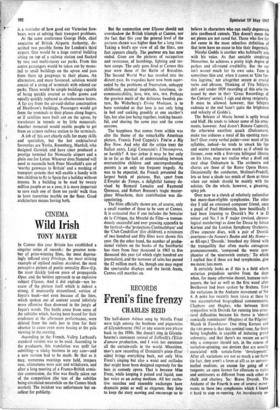Wild Irish
CINEMA TONY MAYER
In Cannes this year Britain has established a singular series of records: the greatest num- ber of prize-winning films, the most depress- ingly inflated story Privilege, the most striking example of stylised realism Accident, the most perceptive picture of poetic unreality Blow-Up, the most thickly laid-on piece of propaganda Opus, and the boldest approach to an explosive subject Ulysses. And it did explode—not be- cause of the picture itself which is indeed a strong, if necessarily streamlined, version of Joyce's book—not even because of the lines, which spoken out of context sound infinitely more offensive than drowned in the jungle at Joyce's words. The battle arose from some of the subtitles which, having been booed for their crudeness at the afternoon performance, were deleted from the reels just in time for their absence to cause even more booing at the gala viewing in the evening.
According to the French, Valery Larbaud's standard version was to be used. According to the producers, this translation was unfit for subtitling—a tricky business in any case—and a new version had to be made. Be that as it may, numerous meetings were held, tempers rose, ultimatums were sent and withdrawn, and after a long meeting of a Franco-British armis- tice commission, the film was finally taken out of the competition (the text of the subtitles being circulated meanwhile on the Cannes black market). The incident was unfortunate but ex- cellent for publicity.
But the commotion over Ulysses should not overshadow the British triumph at Cannes, nor the fact that this year the general level of the pictures shown was higher than for a long time. Taking a bird's eye view of all the films, one fact appears clearly. The postwar era has now ended. Gone are the pictures of occupation and resistance, of bombings, fighting and tor- ture camps. The only guns fired at Cannes this year were those of the Battle of Borodino. The Second World War has receded into the distant past. Its tragedies have now been super- seded by the problems of frustration, unhappy childhood, parental ineptitude, loneliness, in- communicability, love, sex, SEX, sex. Perhaps the greatest merit of the delicious Swedish pic- ture, Bo Widerberg's Eh'ira Madigan, is to have reminded us that love is not only lying in bed and sucking greedily at one another's lips, but also just being together, looking beauti- ful, and sharing the same joys and the same sorrows.
The happiness that comes from within was also the theme of the remarkable American picture, Francis Ford Coppela's You're a Big Boy Now. And why did the critics treat the Italian entry, Luigi Comercini's L'Incompresa, so harshly? A tear jerker it may be but only in so far as the lack of understanding between oversensitive children and uncomprehending parents is an only too frequent tragedy. As was to be expected, the French presented the largest batch of pictures. But, apart from L'Emploi du Temps, a delightful fantasy de- vised by Bernard Lemaire and Raymond Queneau, and Robert Bresson's tragic master- piece Mouchette, their contribution was dis- appointing.
The films officially shown are, of course, only a small number of those to be seen at Cannes. It is estimated that if one includes the Semaine de la Critique, the Marche du Film—a tremen- dously successful and ever growing appendix to the festival—the 'projections Cinematheque' and the 'Club Cendrillon' (for children), a minimum of two hundred and fifty films were shown this year. On the other hand, the number of profes- sional visitors on the books of the Secretariat has risen from four thousand in 1965 to five thousand this year (of which eight hundred are journalists), and the turnover of sales has passed the f2 million mark. So, though one may regret the spectacular displays and the lavish feasts, Cannes still marches on.


































 Previous page
Previous page